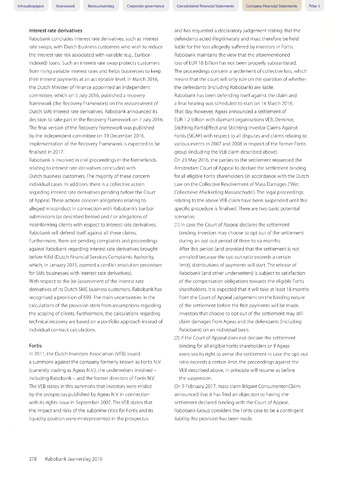Inhoudsopgave Voorwoord Bestuursverslag Corporate governance
Consolidated Financial Statements Company Financial Statements Pillar 3
Interest rate derivatives
Rabobank concludes interest rate derivatives, such as interest
rate swaps, with Dutch business customers who wish to reduce
the interest rate risk associated with variable (e.g., Euribor-
indexed) loans. Such an interest rate swap protects customers
from rising variable interest rates and helps businesses to keep
their interest payments at an acceptable level. In March 2016,
the Dutch Minister of Finance appointed an independent
committee, which on 5 July 2016, published a recovery
framework (the Recovery Framework) on the reassessment of
Dutch SME interest rate derivatives. Rabobank announced its
decision to take part in the Recovery Framework on 7 July 2016.
The final version of the Recovery Framework was published
by the independent committee on 19 December 2016.
Implementation of the Recovery Framework is expected to be
finalised in 2017.
Rabobank is involved in civil proceedings in the Netherlands
relating to interest rate derivatives concluded with
Dutch business customers. The majority of these concern
individual cases. In addition, there is a collective action
regarding interest rate derivatives pending before the Court
of Appeal. These actions concern allegations relating to
alleged misconduct in connection with Rabobank's Euribor
submissions (as described below) and or allegations of
misinforming clients with respect to interest rate derivatives.
Rabobank will defend itself against all these claims.
Furthermore, there are pending complaints and proceedings
against Rabobank regarding interest rate derivatives brought
before Kifid (Dutch Financial Services Complaints Authority,
which, in January 2015, opened a conflict resolution procedure
for SME businesses with interest rate derivatives).
With respect to the (re-)assessment of the interest rate
derivatives of its Dutch SME business customers, Rabobank has
recognised a provision of 699.The main uncertainties in the
calculations of the provision stem from assumptions regarding
the scoping of clients. Furthermore, the calculations regarding
technical recovery are based on a portfolio approach instead of
individual contract calculations.
Fortis
In 2011the Dutch Investors Association (VEB) issued
a summons against the company formerly known as Fortis N.V.
(currently trading as Ageas N.V.), the underwriters involved -
including Rabobank - and the former directors of Fortis N.V.
The VEB states in this summons that investors were misled
by the prospectus published by Ageas N.V. in connection
with its rights issue in September 2007. The VEB states that
the impact and risks of the subprime crisis for Fortis and its
liquidity position were misrepresented in the prospectus
and has requested a declaratory judgement stating that the
defendants acted illegitimately and must therefore be held
liable for the loss allegedly suffered by investors in Fortis.
Rabobank maintains the view that the aforementioned
loss of EUR 18 billion has not been properly substantiated.
The proceedings concern a settlement of collective loss, which
means that the court will only rule on the question of whether
the defendants (including Rabobank) are liable.
Rabobank has been defending itself against the claim and
a final hearing was scheduled to start on 14 March 2016.
That day, however, Ageas announced a settlement of
EUR 1.2 billion with claimant organisations VEB, Deminor,
Stichting FortisEffect and Stichting Investor Claims Against
Fortis (SICAF) with respect to all disputes and claims relating to
various events in 2007 and 2008 in respect of the former Fortis
group (including the VEB claim described above).
On 23 May 2016, the parties to the settlement requested the
Amsterdam Court of Appeal to declare the settlement binding
for all eligible Fortis shareholders (in accordance with the Dutch
Law on the Collective Resolvement of Mass Damages ('Wet
Collectieve Afwikkeling Massaschade').The legal proceedings
relating to the above VEB claim have been suspended until this
specific procedure is finalised. There are two basic potential
scenarios:
(1) In case the Court of Appeal declares the settlement
binding, investors may choose to opt out of the settlement
during an opt-out period of three to six months.
After this period (and provided that the settlement is not
annulled because the opt-out ratio exceeds a certain
limit), distributions of payments will start.The release of
Rabobank (and other underwriters) is subject to satisfaction
of the compensation obligations towards the eligible Fortis
shareholders. It is expected that it will take at least 18 months
from the Court of Appeal judgement on the binding nature
of the settlement before the first payments will be made.
Investors that choose to opt out of the settlement may still
claim damages from Ageas and the defendants (including
Rabobank) on an individual basis.
(2) If the Court of Appeal does not declare the settlement
binding for all eligible Fortis shareholders or if Ageas
exercises its right to annul the settlement in case the opt-out
ratio exceeds a certain limit, the proceedings against the
VEB described above, in principle will resume as before
the suspension.
On 9 February 2017, mass claim litigant ConsumentenClaim
announced that it has filed an objection to having the
settlement declared binding with the Court of Appeal.
Rabobank Group considers the Fortis case to be a contingent
liability. No provision has been made.
278 Rabobank Jaarverslag 2016

